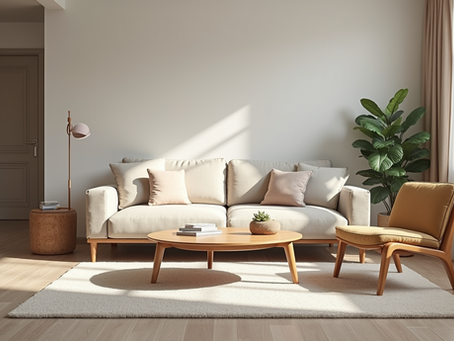Interior Design Perth - Secrets of interior designers and why you should trust them.
- Debbie Anastassiou

- Oct 11, 2018
- 5 min read
Updated: Oct 11, 2025
We all appreciate expertise and actively seek it. Not too long ago, people would "let their fingers do the walking" to find experts. Nowadays, we use our mouse to scroll through options to locate professionals or experts, such as car mechanics, doctors, plumbers, jewelers, and more. Yet, there is one aspect of life where many believe no expertise is necessary—when it comes to arranging our home interiors, we often overlook that there are specialists for this as well.
So, are interior designers experts? Can they truly understand your needs and preferences to create an interior tailored to your lifestyle and taste? What exactly does an interior designer do?

An Interior Designer specializes in customizing spaces Interior Design Perth Interior design Perth Interior design Perth
All of us appreciate and thrive in well-organized spaces that promote functionality and serenity. A well-structured environment not only enhances our ability to focus and accomplish tasks but also contributes significantly to our overall well-being. We aspire to create interiors that allow us to freely perform our daily activities with minimal hindrance, ensuring ease of accessibility to essential items, effective storage solutions that minimize clutter, and adequate comfort that invites relaxation and productivity. Moreover, when we incorporate elements that reflect our personal style into our living spaces, it elevates our experience and makes us feel truly privileged and at home. The colors we choose, the furniture we select, and the decorative accents we add all serve as extensions of our identity, transforming a mere living area into a sanctuary that resonates with who we are. Interior design Perth Interior
In this context, interior designers play a crucial role, as they possess the specialized expertise necessary for organizing space in a manner that maximizes its effectiveness while also ensuring it is aesthetically pleasing for the occupant. Their knowledge encompasses a wide array of elements, including spatial planning, color theory, lighting design, and the selection of materials, which collectively contribute to the creation of harmonious environments. By understanding the needs and preferences of their clients, interior designers can craft spaces that not only meet practical requirements but also evoke emotional responses, making every corner of the home feel inviting and personalized. They are adept at balancing functionality with beauty, ensuring that every piece of furniture and every decorative element serves a purpose while also contributing to the overall visual narrative of the space. Interior design Perth Interior
Furthermore, the importance of well-designed interiors extends beyond mere aesthetics; they can significantly impact our mood, productivity, and even our health. A clutter-free environment, for instance, has been shown to reduce stress and enhance clarity of thought, allowing us to engage more fully in our daily lives. Similarly, thoughtful lighting can influence our circadian rhythms, promoting better sleep patterns and overall well-being. Thus, the work of interior designers is not only about creating beautiful spaces but also about fostering environments that support our physical and mental health. Interior design Perth Interior

Not a style dictator Interior Design Perth Interior design Perth Interior design Perth
The Interior Design profession encompasses more than just an understanding of design principles, space, and color.
Interior Designers are experts in recognizing the physical and psychological needs of their clients. Essentially, talented interior designers prioritize designing for the people who will inhabit the space, rather than focusing solely on the space itself. Rather than imposing a particular style, a skilled interior designer views their role as enabling a lifestyle.
Their goal is consistently to deliver personalized interior design for their clients. To achieve this, in addition to training and experience, the interior designer relies on strong interpersonal skills and inherent talents.
Interpersonal Skills Interior design Perth Interior
1. Communication - the mutual process of listening and providing credible advice through reasoning and explanation.
2. Discernment - the ability to interpret and express what is implied but not explicitly stated by the client.
3. Relating to others - the skill of comprehending others' perspectives, understanding their viewpoints, and not being influenced by personal biases and preferences.

Natural Abilities
1. Sixth sense - the capability to instantly mentally reorganize the space in real time before starting to draw, and envision the completed product, as if the designer has virtually stepped into the suggested space arrangement.
2. Confidence - the belief that their proposal is the optimal solution for their client. Uninfluenced by external objections, they do not second-guess or stray from their informed proposal. This type of confidence reassures their client without causing antagonism.
3. Proactive - Prevention is the best approach, even in design. Designers anticipate and solve problems before they arise. When unexpected issues occur, a proactive designer transforms challenges into opportunities. Interior design Perth Interior

Behind the scenes Interior Design Perth Interior design Perth Interior design Perth
So far, we've discussed what designers do for you, but how exactly do they achieve it? What is the process they undertake behind the scenes to bring your dream interior to life?
Interior designers carry out numerous essential and labor-intensive tasks behind the scenes.
These efforts are not always visible to clients and are often overlooked.

Interior Designer Duties Interior design Perth Interior
Analyze their client's wants and needs.
Develop a relevant design scheme in line with the principles of design and the science of human behavior.
Colour studies
Prepare presentations of the proposed concepts which include drawings 3D rendering, colour and mood boards, to effectively communicate their proposals to their client.
Ensure proposed concepts are safe, ergonomically sound, functional, as well as aesthetically pleasing.
Address environmental and sustainability issues.
Select colors, textures, materials and finishes to meet their client’s aesthetic preferences and psychological needs.
Evaluate the functional, performance, environmental and safety benefits, of their proposals.
Select and specify furniture, fixtures and equipment to best render the particular design concept.
Design bespoke furniture, fixtures and equipment to best render the particular design concept and address particular spatial and functional considerations
Provide project management services, including preparation of project budgets and schedules.
Prepare working drawings and lighting designs.
Act as the client's negotiator and purchasing agent.
Communicating information on the progress and completion of the project
Post-occupancy evaluation and reports on behalf of the client.

More than decorator. Interior design Perth Interior
Without a doubt, interior designers are more than just decorators; they are spatial experts. They grasp how space interacts with and influences human life, and their comprehensive design approach extends beyond mere aesthetics. Their purpose is to enable occupants to express themselves and their lifestyles. Interior design Perth Interior

Reclaim your space, express your style and live the life you want! Interior design Perth Interior











Comments